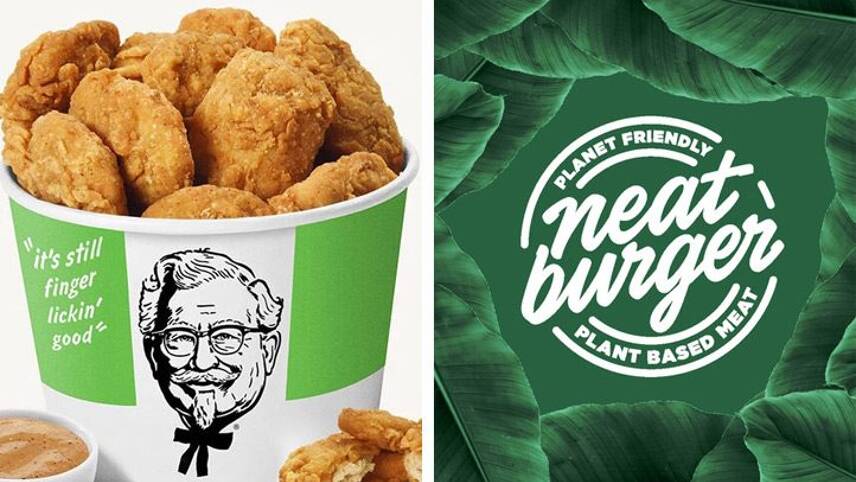Register for free and continue reading
Join our growing army of changemakers and get unlimited access to our premium content

Image credits: KFC and Neat Burger
The number of people identifying as vegan in the UK has increased by 350% since 2008, according to research by the Vegan Society. This trend is largely driven by a better understanding of healthy eating and the impact that meat and dairy and livestock farming have on the planet and climate change.
The latest company to make moves in the alternative protein market, currently valued at $19.5bn, is KFC. Having researched meat-free chicken alternatives, the company has now commenced trials of alternative chicken nuggets produced by Beyond Meat.
Taking to Twitter, KFC described the trials as a ‘Kentucky Fried Miracle’ after the products sold out in five hours. The company is now considering a rollout across the US, depending on customer feedback results.
The company is the latest in the food-to-go sector to introduce plant-based alternatives to meat. US-based fast-food chains White Castle and Carl’s Jr have both added Impossible Foods’ Beyond Burger – a ‘bleeding’ alternative to beef patties – to their takeaway menus.
McDonald’s UK has begun selling a spicy veggie wrap as part of its main meal menu, with a smaller version available as a Happy Meal. Earlier this year, Greggs launched a vegan version of its best-selling pastry – the sausage roll. The savoury treat, which is being sold for £1-1.20, had sold out in many of the brand’s 1,850 UK locations by lunchtime.
And after adding vegan cheese to its offering for the first time last year, Pizza Hut UK has debuted a vegan version of its BBQ pork pizza, which uses pulled jackfruit as a meat substitute.
Formula food
There is, however, a new company emerging in this sector.
Lewis Hamilton, who became vegan in 2017, has this week announced the launch of Neat Burger, which will serve three burgers: ‘The Neat’, ‘The Cheese’ and ‘The Chick’n’, and a plant-based hot dog. All the food produced will be made using the alternative protein provided by Beyond Meat.
“As someone who follows a plant-based diet, I believe we need a healthier high street option that tastes amazing but also offers something exciting to those who want to be meat-free every now and again,” Hamilton said. “Beyond Meat is an incredible partner and I can’t wait to work with the team to expand Neat Burger internationally.”
Hospitality firm The Cream Group, investors and the UNICEF Ambassador will all be involved with Neat Burger to some degree.
Neat Burger’s first store will open on Monday (2 September) in central London, and will also serve dairy-free milkshakes. A further 14 restaurants will open over the next two years.
Vegan context
Oxford University has dubbed veganism as the “single biggest way” for a person to reduce their negative impact on the planet.
GHG emissions from the livestock sector estimated to account for 15% of the global total. This figure is set to hit 80% of the planet’s carbon budget by 2050 as the global population grows to reach 10 billion people – who will need to be fed in in a more sustainable way than at present.
The global meat sector is widely classed as a key contributor to climate change – and one of the worst-prepared industries for climate challenges such as droughts, floods and heatwaves in the world.
Indeed, none of the industry’s major corporates have aligned themselves with the Paris Agreement’s flagship goal of limiting the world’s temperature increase to 1.5C, with only 28% of the world’s largest 60 intensive farming firms having to set any plans for climate risk mitigation.
Moreover, producing meat and dairy products is an extremely water-intense process. The IME claims that producing 1kg of meat requires between 5,000 and 20,000 litres of water, compared to around 500-4,000 litres of water for 1kg of wheat.
With water requirements for food production set to reach around 10-13.5 trillion cubic metres per year by 2050 – about triple the current amount used annually by humans for all purposes – reducing our reliance on animal-based proteins has been posited by several experts as an effective way to combat water scarcity and preserve natural resources.
Globally, meat provides just 18% of the calories consumed by humans each year – but its production takes up 83% of all existing farmland.
These facts have led to consumer demand for change. In the supermarket sector, most of the UK’s key players have launched new product lines, after Tesco predicted in 2017 that plant-based protein would be the fastest-growing food market of 2018. Since then, the retailer has launched a line of 30 plant-based meals called ‘Wicked Kitchen’ and recorded a 25% increase in sales of food-to-go products marked vegan or vegetarian.
Sainsbury’s, meanwhile, increased its vegan range by 10% last year, adding products such as beef-free mince and Tofurky – a tofu-based turkey substitute – to its portfolio. Similarly, Waitrose & Partners added dozens of new vegan lines to its stores in October 2018, including cashew-based mac and cheese, vegan fishcakes and egg-free mayonnaise.
Matt Mace


Please login or Register to leave a comment.